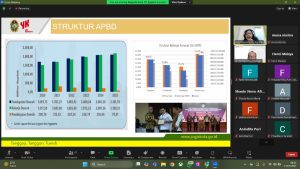Yogyakarta, May 15, 2025 – The Undergraduate Program in Urban and Regional Planning (PWK) at Universitas Gadjah Mada, in collaboration with the Master’s Program in Urban and Regional Planning, held another online guest lecture on Thursday, May 15, 2025, titled “Innovation Challenges in the Economic Development of Yogyakarta City.”
The lecture featured Agustin Wijayanti, S.Si., M.Ec.Dev., Head of the Planning Division of the Yogyakarta City Development Planning Agency (Bappeda). The session was moderated by Dr. Eng. Ir. Muhammad Sani Roychansyah, S.T., M.Eng., lecturer of the Urban Economics course. The event was attended by students from both the undergraduate and master’s programs of Urban Economics, and was also open to the public.
The lecture began with an overview of the current economic conditions in Yogyakarta City. Economically, the city is largely dominated by the communication and informatics sector; however, this sector has not shown significant growth. As a result, the accommodation and food services sector remains the main source of income for the city.
In terms of budget structure, employee expenditures still dominate the Regional Revenue and Expenditure Budget (APBD), indicating that government spending is yet to be significantly directed toward infrastructure development or poverty alleviation programs.
On the other hand, the city’s locally generated revenue (PAD) is mainly derived from local taxes, especially from hotels and restaurants. This reinforces the importance of the tourism and service sectors as key drivers of Yogyakarta’s economy.
A major challenge facing the city is the dualism in development: while economic growth is high, the unemployment rate remains elevated. Despite relatively high education levels among residents, job availability is still inadequate.
To address these economic challenges and opportunities, the city has outlined an innovation strategy in its Regional Long-Term Development Plan (RPJPD), known as the Segoro Amarto (5K) Collaboration. This involves collaborative efforts among Kampungs, Campuses, the City Government, Corporations, and Communities to tackle poverty and unemployment in an integrated manner. The TSLP (Corporate Social and Environmental Responsibility) program and forum is one of the key implementations of this strategy.
The city’s innovation and economic challenges are closely aligned with several Sustainable Development Goals (SDGs), including SDG 1 (No Poverty), SDG 2 (Zero Hunger), SDG 8 (Decent Work and Economic Growth), SDG 9 (Industry, Innovation, and Infrastructure), SDG 10 (Reduced Inequalities), SDG 11 (Sustainable Cities and Communities), and SDG 17 (Partnerships for the Goals).
Another interesting point raised during the lecture was the impact of various events held in Yogyakarta. These events have become strong catalysts for other sectors, especially the economy. One notable example is ArtJog, which has significantly contributed to the local economy by increasing the length of stay (LoS) for visitors and boosting the creative economy sector.

